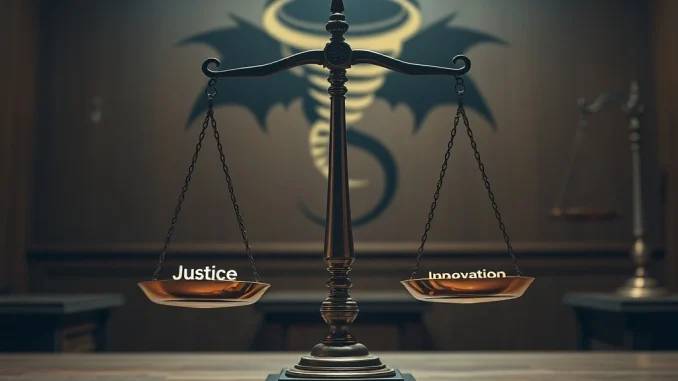
The crypto world is buzzing with a development that could redefine the landscape of venture capital in decentralized finance. The U.S. Department of Justice (DOJ) has launched an intensive investigation into executives at Dragonfly Capital, a prominent crypto venture capital firm. The focus? Their early involvement in funding Tornado Cash, an Ethereum mixer that later became a sanctions target. This isn’t just another regulatory hurdle; it’s a potential game-changer for how VCs operate in the crypto space, particularly concerning their exposure to projects with ambiguous regulatory profiles. The implications for DOJ Tornado Cash enforcement are profound, signaling a new era of accountability.
Unpacking the DOJ Tornado Cash Investigation: What’s at Stake?
The core of the DOJ’s inquiry revolves around Dragonfly Capital’s investment in Tornado Cash back in 2020, long before it was officially sanctioned. Prosecutors are scrutinizing not only the financial backing but also the communications between Dragonfly’s founders and Tornado Cash developers, including co-founder Roman Storm, who is already facing federal charges for alleged money laundering. The central argument is whether Dragonfly’s early financial and technical engagement might have inadvertently facilitated illicit transactions, such as those linked to notorious ransomware attacks.
This approach marks a significant strategic shift for regulators. Traditionally, enforcement actions primarily targeted the creators or direct operators of illicit platforms. However, by focusing on institutional investors like Dragonfly, the DOJ is signaling an expansion of liability. This could set a precedent where even pre-sanction engagement, especially if it involves active communication and strategic input, might be deemed a material contribution to a project’s harmful applications. Haseeb Qureshi, Dragonfly’s Managing Partner, has vehemently denied these allegations, stating, “The prospect of such charges is outrageous and legally unfounded.” He asserts that their investment followed independent legal review, confirming compliance at the time, and underscores Dragonfly’s commitment to supporting privacy-preserving technologies and open-source innovation.
Dragonfly Capital Under Fire: A Closer Look at the Allegations
The spotlight on Dragonfly Capital isn’t merely about an investment; it’s about the depth of their engagement. Prosecutors are digging into:
- Early Investment (2020): The timing is crucial. While the investment predates Tornado Cash’s sanctioning in 2022, the DOJ is examining if Dragonfly had reason to foresee potential misuse or if their support inadvertently helped scale a tool later exploited by bad actors.
- Developer Communications: Beyond just capital, the nature of interactions with Tornado Cash developers, including Roman Storm, is under scrutiny. Were these purely advisory, or did they involve technical guidance that could be interpreted as facilitating the mixer’s operations?
- Material Contribution: The prosecution’s theory hinges on the idea that even without operational control, early-stage financial and strategic support can constitute a ‘material contribution’ to systemic financial crime, especially in the context of decentralized projects.
Adding another layer of complexity, Tom Schmidt, another co-founder of Dragonfly, has invoked the Fifth Amendment during legal proceedings, which can be perceived in various ways but certainly doesn’t simplify the firm’s position. This situation forces the crypto industry to re-evaluate the line between fostering innovation and inadvertently enabling illicit activities.
The Looming Threat of Crypto VC Liability
Perhaps the most profound implication of this investigation is the potential redefinition of crypto VC liability. Venture capital firms typically operate under the premise of limited liability, disclaiming operational control over their portfolio companies. However, the DOJ’s current stance challenges this long-held understanding within the decentralized ecosystem. If charges proceed, the case could:
- Expand Culpability: Liability could extend beyond direct operational control to encompass pre-sanction financial and strategic ties. This means VCs might be held accountable for the downstream misuse of technologies they fund, even if they weren’t directly involved in the misuse.
- Redefine Due Diligence: VCs would need to conduct even more rigorous due diligence, not just on a project’s current legality but also on its potential for future regulatory scrutiny and misuse, especially for privacy-enhancing or anonymity-focused tools.
- Impact Investment Strategy: Firms might become more cautious about investing in projects with high regulatory ambiguity or those that could be dual-use technologies (beneficial for privacy, but also exploitable for illicit purposes).
This development sends a stark warning across the entire venture capital landscape, compelling firms to reassess their risk frameworks and engagement models with decentralized projects.
Tornado Cash Funding: A Retrospective Legal Challenge
The controversy surrounding Tornado Cash funding by Dragonfly highlights a critical tension: investing in cutting-edge technology versus navigating evolving legal frameworks. Dragonfly’s defense centers on the idea that their investment was legally compliant at the time it was made, and that they were supporting open-source, privacy-preserving technology. However, the DOJ’s investigation is applying retrospective legal scrutiny, examining past actions through the lens of current enforcement priorities and the subsequent designation of Tornado Cash as a sanctions target.
This puts VCs in a precarious position. How can they innovate and support groundbreaking projects if they face potential criminal charges for investments made years ago, under different regulatory understandings? The case will likely test whether a firm’s intent and compliance at the time of investment are sufficient defense against allegations of facilitating illicit activity after the fact. It underscores the inherent risks of operating in a rapidly evolving technological and regulatory environment where legal interpretations can shift dramatically.
Navigating DeFi Regulation: A Broader Impact on the Industry
The investigation into Dragonfly Capital is not an isolated incident; it’s part of a broader, intensified crackdown on the crypto sector, particularly concerning DeFi regulation. Since Tornado Cash was sanctioned in 2022, regulators have been aggressively tracing financial networks and holding various entities accountable. This includes:
- Increased Scrutiny on Mixers: Anonymity-enhancing tools are under intense pressure, with authorities viewing them as primary conduits for money laundering and sanctions evasion.
- Focus on Decentralization Claims: Prosecutors are increasingly challenging claims of true decentralization, arguing that even if a project is technically decentralized, early human involvement (like VC funding and developer communication) can create a nexus for liability.
- Global Enforcement Collaboration: Expect more coordinated efforts between international law enforcement agencies to combat crypto-related financial crime.
This case serves as a powerful cautionary tale for all venture firms and investors in the DeFi space. It emphasizes the need for robust legal frameworks, proactive compliance measures, and a deep understanding of potential regulatory shifts. The industry must grapple with the challenge of fostering innovation while simultaneously adhering to evolving legal and ethical standards, especially when dealing with technologies that can be used for both legitimate and illicit purposes.
Conclusion: A Watershed Moment for Crypto Venture Capital?
The DOJ’s probe into Dragonfly Capital executives over their Tornado Cash funding is more than just a legal battle; it’s a critical moment for the entire crypto venture capital ecosystem. It challenges the traditional understanding of VC liability, forcing firms to confront the complexities of investing in decentralized, open-source technologies that can be exploited for illicit ends. While Dragonfly asserts its commitment to supporting innovation and its prior compliance, the outcome of this investigation could set far-reaching precedents for how VCs assess and manage regulatory risks in the ever-evolving landscape of decentralized finance. As the crypto industry matures, the tension between innovation and regulatory compliance will only intensify, making cases like this pivotal in shaping its future.
Frequently Asked Questions (FAQs)
Q1: Why is the DOJ investigating Dragonfly Capital regarding Tornado Cash?
The DOJ is investigating Dragonfly Capital executives for their early 2020 investment in and communications with developers of Tornado Cash, an Ethereum mixer later designated as a sanctions target. Prosecutors are examining whether this involvement facilitated illicit transactions, such as those linked to ransomware attacks, and if it constitutes a ‘material contribution’ to financial crime.
Q2: What is the significance of this investigation for crypto venture capital firms?
This investigation is significant because it marks a shift in regulatory strategy, targeting institutional investors rather than solely project creators. It could redefine crypto VC liability by expanding culpability beyond operational control to include pre-sanction financial and strategic ties, potentially forcing VCs to reassess their due diligence and investment strategies for decentralized projects.
Q3: What is Dragonfly Capital’s defense against these allegations?
Dragonfly Capital’s Managing Partner, Haseeb Qureshi, has strongly contested the allegations, asserting that the firm’s investment followed an independent legal review confirming compliance with federal regulations at the time. He emphasizes Dragonfly’s commitment to supporting privacy-preserving technologies and open-source innovation, arguing the charges are “outrageous and legally unfounded.”
Q4: How does this case relate to the ongoing trial of Roman Storm?
The case intersects with the ongoing trial of Roman Storm, a co-founder of Tornado Cash who faces federal charges. Prosecutors argue that Dragonfly’s involvement creates a direct link between its actions and the mixer’s harmful applications, potentially strengthening the broader case against those involved with Tornado Cash.
Q5: What are the broader implications for DeFi regulation?
The potential charges against Dragonfly highlight intensified enforcement against crypto entities with ambiguous regulatory profiles. It signals increased scrutiny on anonymity-enhancing tools and challenges claims of true decentralization. This could lead to more stringent compliance requirements and alter how VCs assess regulatory risks in the entire DeFi sector.



